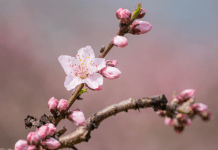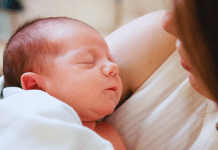Are you considered an “old mom”, too? Christalyne shares her journey of having a child after 30.
2023 marked the first year in the U.S. that the median age for first-time moms hit the 30’s. As someone who waited until after 35 to become pregnant for the first time and just welcomed my second at nearly 40, I am part of the group raising the national mean and normalizing “geriatric” pregnancy. While many of my high school classmates now have high schoolers, I am still elbow-deep in diapers and daycare, joking about hitting retirement age before my kids finish college.
Despite the increased fatigue, having to pay closer attention to diet and health, and even the annoying extra doctors appointments and tests that OB/GYN’s insist you have after crossing into the “Advanced Maternal Age” mark, there are many benefits to being an older mom. For those that may be weighing the pro’s and con’s, here are just a few.
Less Stress, More Stability
For one, my life is so much more stable than it was in my 20’s and even early 30’s. Many parents who chose to wait prioritized personal development and careers during this time so that when the time came to finally welcome a child into it, they had more financial stability, maturity and emotional intelligence that can act as a major benefit when parenting.
Less Postpartum Depression
Statistically speaking, older moms are less likely to suffer from postpartum depression and anxiety, with the exception of mom’s over 40 who have twins. While baby blues are very common and associated with the extreme hormonal changes that occur directly after birth, postpartum depression has been linked to other factors.
Older moms are likely to have more friends who are also moms at this point in their life as well as a more stable home environment. Since PPD is linked to a lack of support and higher stress levels in general, it makes sense that having a strong support system would be helpful during this time in lowering anxiety and depression levels..
Increased Overall Health for the Children
One of the risk factors of being an older mom is the increased likelihood of birth defects and chromosomal disorders such as Downs Syndrome. The risk, though higher than younger moms, is still relatively low and those that give birth to healthy babies tend to have children with overall better health in later years overall.
The children are less likely to experience serious illness, injury or even obesity than their peers born to younger parents. In addition, they are more likely to be better behaved, socialized and emotionally healthy, as well as perform better in school. This is thought to be in part due to the parent’s maturity and emotional stability, as well as socioeconomic factors.
Longer Lives, Sharper Brains
You’d think that the increased fatigue that comes with having children later in life would have the opposite effect, but a study published in 2015 found that women who give birth after the age of 33 are twice as likely to live to the age of 95 or beyond than those who become mothers at a younger age.
Even better, older moms have been found to have better cognitive abilities and memory recall post-menopause than their younger parent counterparts. They were also better problem solvers overall, giving hope to all of us who have recently had babies and are currently feeling braindead.

















